

Games for presenting. Object of Play Before you begin, focus on the end.
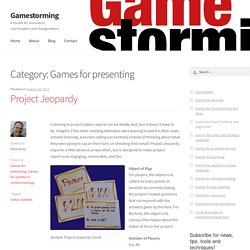
In this exercise, teams create the physical “box” that sells their idea—whether that idea will ultimately become a tangible product or not. By imagining the package for their idea, the teams make decisions about important features and other aspects of their vision that are more difficult to articulate. This game is popular among software developers when setting out to capture the customer’s view of a new application, but its use doesn’t stop there. The game can help facilitate any vision-oriented discussion, and has been used to describe topics ranging from “our future methodology” to “the ideal hire.”
In all cases, the box is a focusing device: it wraps up a lot of otherwise intangible information into a nice physical object, prompting decisions along the way. Number of Players Duration of Play 1 hour or more, depending on the number of groups and depth of discussion. Setup How to play Phase One: Fill the Box Phase Two: Make the Box Strategy. Marc F. Bellemare» Blog Archive » 22 Tips for Conference and Seminar Presentations. A graduate student whose (excellent) second-year paper was accepted at a few conferences came to my office last week to ask me how she should prepare her conference presentations.
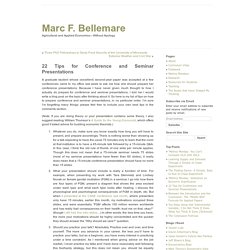
Because I have never given much thought to how I actually do prepare for conference and seminar presentations, I told her I would write a blog post on the topic after thinking about it. So here is my list of tips on how to prepare conference and seminar presentations, in no particular order. I’m sure I’m forgetting many things; please feel free to include your own best tips in the comments section. (Note: If you are doing theory or your presentation contains some theory, I also suggest reading William Thomson’s A Guide for the Young Economist, which offers good if dated advice for budding economic theorists.)
Whatever you do, make sure you know exactly how long you will have to present, and prepare accordingly. Making a short presentation based on your research: 11 tips. Oral Presentation Tips, Center for Undergraduate Excellence, U.Va. You’ve been working on your research for months, and now that it’s finished, or almost there, you need to make an oral presentation.
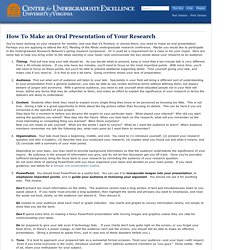
Perhaps you are applying to attend the ACC Meeting of the Minds undergraduate research conference. Maybe you would like to participate in the Undergraduate Research Network’s spring research symposium. Or it could be a requirement for a class or for your major. Here are some tips to help you bring order to the ideas swirling in your head—and communicate the key points about your research to an audience. Timing.
Make Body Language Your Superpower. 7 Storytelling Techniques Used by the Most Inspiring TED Presenters. A couple of years ago, as a participant of a master’s program in Denmark, I met a fellow journalist from Chile who gave me a lesson on storytelling that I will never forget.

I was in class, half-listening to the end of a monotonous PowerPoint presentation on the history of media, when the next presenter on the list—the Chilean journalist—was called to go up to the podium. His name was Enrique Núñez, one of the quietest students in the class. All I knew about him was that he always sat in the very front row and, unlike the other students, paid the utmost attention to every word that was said. As he prepared his notes behind the podium, everyone continued to type away behind their laptop screens. What happened next, however, caught everyone by surprise. A great TED talk: 30 day challenge - Figure. Forbes Welcome. Thanks for coming to Forbes.

Please turn off your ad blocker in order to continue. To thank you for doing so, we’re happy to present you with an ad-light experience. Hi again. Making presentations in the TED style. TED has earned a lot of attention over the years for many reasons, including the nature and quality of its short-form conference presentations.
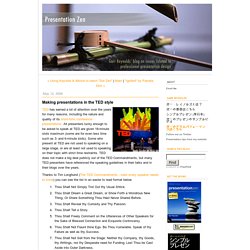
How to Give a Great TED Talk. 10 PowerPoint Tips for Teachers. Both of these statements are likely to generate a lot of debate and even though the author has led a move to ban on PowerPoint in the classroom and lecture hall, he can’t be as strongly adverse to PowerPoint as these statements would suggest because he says: “We do allow lecturers to use it to show images and videos as well as quotes from primary authors.”

However, he prefers that the main content should be given with a ‘chalk and talk’ approach because with PowerPoint there is less improvisation, teachers read their bullet points off the screen and while students may take them as authoritative fact, it bores them at the same time. The author also mentions that students used to complain about the PowerPoint presentation not being shared before the presentation. After reading with the article, I was left with this image of the author’s experience of presentations in my head. I would argue that if your PowerPoint presentation looks like this, the problem isn’t with the presentation software. 8 Classic storytelling techniques for engaging presentations. Develop Your Speaking Skills.
How to Design a Powerful Presentation. Remember clip art and motion effects from the 90’s?

The days of clumsy presentation templates are over, and the ability to create beautifully designed slides is easier than ever. Why Are Presentation Skills Important? Articles for Business Professionals Why Are Presentation Skills Important?
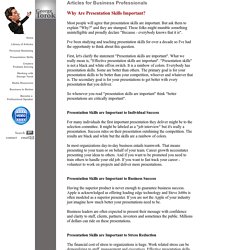
Howtotalk.pdf. Welcome to Forbes. 10 Tips for a Good Presentation. The ability to communicate well is an important skill for any student attending university.
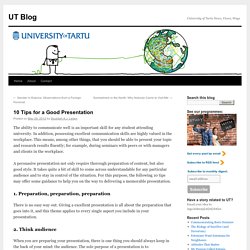
In addition, possessing excellent communication skills are highly valued in the workplace. 27 Presentation Tips For Students And Teachers. 15 Strategies for Giving Oral Presentations. More than death and taxes, the thing people fear most is speaking in public. Needless to say, college students are not immune from this terror, which, for you psychology hounds, even has a name: glossophobia. Unfortunately, in college, it's not always so easy to avoid public speaking. Some schools have required courses in speech. And even in colleges where speech isn't a subject, there often is a broad variety of courses that incorporate presentations or reports–and sometimes full-length seminars–into the regular class activities. Still, there's no need to lose your breakfast (or lunch or dinner) over your upcoming presentation. 1. 4-Star Tip. 2. 3.